
[KIT 69, page 417]
To test its accuracy, The New World Translation Bible was cross checked with the Watchtower's own Greek Version called The Kingdom Interlinear Translation of the Greek Scriptures.
|
|
In the Watchtower's 'Kingdom Interlinear Translation
of the Greek Scriptures,' 1985 edition, on title page 3, it says:
GREEK TEXT ABOVE The New Testament in the Original Greek, by B. F. Westcott and F. J. A. Hort - 1881 ENGLISH TEXT UNDERNEATH An interlinear word-for-word translation into English - 1969 ENGLISH TEXT ALONGSIDE The New World Translation of the Holy Scriptures, Matthew through Revelation - 1984 Revision |
The Watchtower Society encourages Bible examination, even if it's of their own Bible.
"This is a clothbound book of 1,184 pages. The Greek text that it uses is that prepared and published by Westcott and Hort in 1881. Underneath this is printed a literal word-for-word translation. In the righthand column alongside on each page is presented the modern-day translation as found in the New World Translation of the Holy Scriptures in a revised edition. However, in the interlinear literal translation of the Greek the English words are not taken bodily or directly from the New World Translation and placed under the appropriate Greek word. No! But under each Greek word is placed its basic meaning, according to its grammatical construction, whether this agrees literally with the New World Translation or not. What we as Bible students should want is what the original Greek text says. Only by getting this basic meaning can we determine whether the New World Translation or any other Bible translation is right or not." [Watchtower Nov. 15, 1969, p. 692, par.10.]
KJV = King James Version.
NWT = New World Translation [Watchtower Bible].
KIT 69 = Kingdom Interlinear Translation, 1969 edition.
KIT 85 = Kingdom Interlinear Translation, 1985 edition.
Others listed as used.
In the beginning was the Word, and the Word was with God, and the Word was God. John 1:1 (KJV)This clear statement by John, the apostle closest to Christ Jesus, is a confession of his belief. As The Watchtower does not accept this as truth they change their translation of John 1:1 to read:-
. "In [the] beginning the Word was, and the Word was with God, and the Word was a god." NWT.NB.

[KIT 69, page 417]
Notice the difference in The Watchtower translation of the Greek in the right hand column, from the English beneath the Greek in the left hand column. I have 'circled' the areas.
What Greek Scholars Say.
Dr Julius R.Mantey calls the Watchtower translation of John 1:1 "A grossly misleading translation. It is neither scholarly nor reasonable to translate John 1:1 'The Word was a god'." [Dr. J.R. Mantey is quoted on pp. 1158/9 of KIT 69.]
Bruce M.Metzger, Professor of New Testament Language and Literature at Princeton Theological Seminary said: "Far more pernicious in this same verse is the rendering ... 'and the Word was a god,' with the following footnote: "'A god.' In contrast with 'the God'." It must be stated quite frankly that, if the Jehovah's Witnesses take this translation seriously, they are polytheists. In view of the additional light which is available during this age of Grace, such a representation is even more reprehensible than were the heathenish, polytheistic errors into which ancient Israel was so prone to fail. As a matter of solid fact, however, such a rendering is a frightful mistranslation."
Dr. J.J.Griesbach: "So numerous and clear are the arguments and testimonies of Scripture in favour of the true Deity of Christ, that I can hardly imagine how, upon the admission of the Divine authority of Scripture, and with regard to fair rules of interpretation, this doctrine can by any man be called into doubt. Especially the passage John 1:1 is so clear and so superior to all exception, that by no daring efforts of either commentators or critics can it be snatched out of the hands of the defenders of the truth."
Dr. William Barclay, University of Glasgow, Scotland: "The deliberate distortion of truth by this sect is seen in their New Testament translations. John 1:1 is translated: '... the Word was a god,' a translation which is grammatically impossible. It is abundantly clear that a sect which can translate the New Testament like this is intellectually dishonest."
Dr. Eugene A.Nida, Head of the Translation Department of the American Bible Society: "With regard to John 1:1 there is, of course, a complication simply because the New World Translation was apparently done by persons who did not take seriously the syntax of the Greek."
Dr. B.F.Westcott, whose Greek text is used in the Watchtower Kingdom Interlinear: "The predicate (God) stands emphatically first, as in 1 v.24. It is necessary without the article. ... No idea of inferiority of nature is suggested by the form of expression, which simply affirms the true Deity of the Word ... in the third clause 'the Word' is declared to be 'God' and so included in the unity of the Godhead."
Dr. Ernest C.Colwell, University of Chicago: "A definite predicate nominative has the article when it follows the verb; ... this statement cannot be regarded as strange in the prologue of the gospel which reaches its climax in the confession of Thomas, 'My Lord and my God, John 20:28'."
[The above 7 quotes are taken from 'Thus Saith the Governing Body," page 58, by Randall Watters, Box 3818, Manhattan Beach, CA 90266.]
Dr. James L.Boyer, of Winona Lake, Indiana: "I have never heard of, or read of any Greek Scholar who would agree to the interpretation of this verse insisted upon by the Jehovah's Witnesses. ... I have never encountered one of them who had any knowledge of the Greek language."
Dr. Paul L.Kaufman, "The Jehovah's Witnesses people evidence an abysmal ignorance of the basic tenets of Greek grammar in their mistranslation of John 1:1." [Dr. Paul L. Kaufman of Portland, Oregon.]
Dr. Samuel J.Mikolaski, "This anarthrous (used without the article) construction does not mean what the indefinite article 'a' means in English. It is monstrous to translate the phrase 'the Word was a god'." [Dr. Samuel J. Mikolaski of Zurich, Switzerland.]
Dr. Charles L.Feinberg, of La Mirada, California: "I can assure you that the rendering which the Jehovah's Witnesses give John 1:1 is not held by any reputable Greek scholar."
Dr. F.F.Bruce, of the University of Manchester, England: "Much is made by amateur Arian grammarians of the omission of the definite article with 'God' in the phrase 'And the Word was God.' Such an omission is common with nouns in a predicative construction. ... 'a god' would be totally indefensible."
Dr. J.Johnson, of California State University, Long Beach, "No justification whatsoever for translating 'theos en ho logos' as 'the Word was a god.' There is no syntactical parallel to Acts 23:6 where there is a statement in indirect discourse; John 1:1 is direct. ... I am neither a Christian nor a Trinitarian." [NB. The Watchtower sometimes refer to Acts 23:6 as an example which confirms their translation of John 1:1.]
Dr. Walter R.Martin, (who does not teach Greek but has studied the language, and before his death was one of the foremost authorities on Jehovah's Witnesses.) "The translation ... 'a god' instead of 'God' is erroneous and unsupported by any good Greek scholarship, ancient or contemporary and is a translation rejected by all recognized scholars of the Greek language, many of whom are not even Christians, and [who] cannot fairly be said to be biased in favour of the orthodox contention."
Dr. Philip B.Harmer, of Heidelberg College: "The verb preceding an anarthrous predicate, would probably mean that the logos was 'a god' or a divine being of some kind, belonging to the general category of theos but as distinct from ho theos. In the form that John actually uses, the word "theos" is placed at the beginning for emphasis."
[The above 8 quotes are from Help Jesus Ministry, PO box 2212, (Stn.) "R" Kelowna, B.C. Canada.]
I believe it valuable to ascertain what recognized Greek scholars have to say on the way The Watchtower Society has translated John 1:1 before we go on to examine, [as non-Greek scholars,] the New World Translation, of Jehovah's Witnesses. After all, while we may not be Greek scholars, it is good to learn the truth from those that are.
Going back to [KIT 69, page 417] we see very clearly that the
Greek is:-
"kai qeoV
hn o logoV."And the English is:- "and
God was the Word."
The Watchtower translation, right hand column, reads: "and the Word was a god."
If you recall, The Watchtower instructed us to examine the Greek to see if The New World Translation is correct (last sentence of the following quote).
However, in the interlinear literal translation of the Greek the English words are not taken bodily or directly from the New World Translation and placed under the appropriate Greek word. No! But under each Greek word is placed its basic meaning, according to its grammatical construction, whether this agrees literally with the New World Translation or not. What we as Bible students should want is what the original Greek text says. Only by getting this basic meaning can we determine whether the New World Translation or any other Bible translation is right or not.We are forced into the conclusion that the New World Translation has not kept to the Greek they use, because the English beneath the Greek clearly says:[Watchtower Nov. 15, 1969, p. 692, par.10.]
"and God was the Word."
On page 54 of The Watchtower booklet, '"THE WORD" - WHO IS HE ACCORDING TO JOHN,' 1962, appears the following reproduction of a 4th century uncial manuscript.
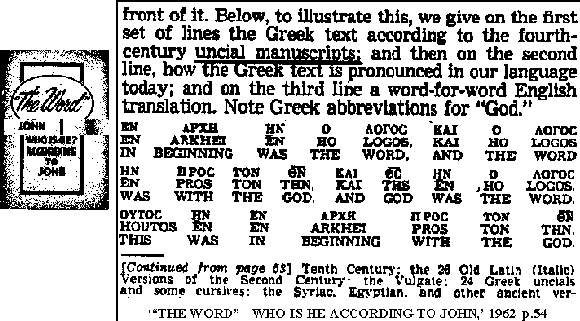
Here we see that the Greek text was all in capitals, therefore it is up to the translator whether a word is given a capital or not.
In a Watchtower Questions from Readers, the question was posed:
"In John 1:1 the term "god" is applied to both the Father and the Son, the Word. But in the Greek text the word for "god" (theos) is written differently in these two instances. Why? What does it mean?"The article helps us understand that the Greek words theos and theon have identical meaning; God in both instances."To a person unfamiliar with the Greek language it might seem that there is a significance indicated by the fact that first the word is spelled theon and next theos. But the difference is simply a matter of complying with the Greek grammatical case used. .....
..... used in each. So the fact that theos is spelled differently in its two occurrences in John 1:1 does not show any difference in meaning; "god" is the meaning in both instances." THE WATCHTOWER, MAY 15, 1977 319
Notice that The Watchtower article says that the two Greek words
mean "god," no capitals, in both instances. Why don't they insert it uncapitalized
[in
their translation of John 1:1] in connection with "Almighty God Jehovah"?
The Watchtower decided not to give the Greek
word theos a capital because it applies to Jesus Christ, the Word. In the
1st article of this series, we learned that The Watchtower denies the Deity
of Christ Jesus, so when they translate John 1:1 as "and the Word was a
god" it is based, not upon good Greek grammar, but on a doctrinal belief.
In the very same article quoted above, The Watchtower Society deliberately leaves out part of a quotation to make the writer say the exact opposite to what he meant. Note the gap (....) in the sentence highlighted.
"......... If John had said ho theos en ho logos, using a definite article in front of both nouns, then he would definitely have identified the logos [the Word] with God, but because he has no definite article in front of theos it becomes a description, and more of an adjective than a noun. The translation then becomes, to put it rather clumsily, 'The Word was in the same class as God, belonged to the same order of being as God'.... John is not here identifying the Word with God. To put it very simply, he does not say that Jesus was God." -Many Witnesses, One Lord (1963), pages 23,24. By William Barclay.You will notice that The Watchtower quote of William Barclay's book, 'Many Witnesses, One Lord,' has bypassed some of the quote. In its place they have inserted 4 dots. When William Barclay's book was researched it was found that The Watchtower had left out 48 words, which make it very plain that Barclay believed that the Word was God.
THE 48 MISSING WORDS (in red, below) tell a different story:
"....... The translation then becomes, to put it rather clumsily, 'The Word was in the same class as God, belonged to the same order of being as God.' The only modern translator who fairly and squarely faced this problem is Kenneth Wuest, who has: 'The Word was as to his essence essential deity.' But it is here that the NEB has brilliantly solved the problem with the absolutely accurate rendering: 'What God was the Word was.' John is not here identifying the Word with God. To put it very simply, he does not say that Jesus was God."While you may not necessarily agree with William Barclay's view, yet this proves the extent to which The Watchtower Society is prepared to go to hide the truth that, to quote the NEB, 'What God was the Word was.'MANY WITNESSES ONE LORD, by William Barclay, p.23.
The Watchtower argues that Jesus cannot be the same God He is with, therefore He cannot be God:
"The articular construction of the noun points to an identity, a personality, whereas a singular anarthrous predicate noun preceding the verb points to a quality about someone. Therefore, John's statement that the Word, or Logos, was 'a god' or 'divine' or 'godlike' does not mean that he was the God with whom he was." KINGDOM INTERLINEAR TRANSLATION 1985 P.1139.Here they reveal their total lack of understanding of the concept of the Trinity. However, in their own translation we can show that Jesus was, in His very nature, God. Hebrews 1:3, talking about Jesus, says:
"He is the reflection of [his] glory and the exact representation of his very being..." Hebrews 1:3, New World Translation.That clearly states that what God is, the Word is, that the Word, Christ Jesus, shares God's exact being, or nature.
The Watchtower Society hasn't added the indefinite article at other occurrences of the anarthrous theos. Otherwise they would read:-
Scripture tells us that when Jesus was on earth, He was still God.
"For in him dwelleth all the fulness of the Godhead bodily."This presents a problem for The Watchtower Society so they make a change in their translation, which reads:Colossians 2:9 (KJV)
Christians pray that by letting the Holy Spirit have His way in their lives, they would show 'divine qualities.'"Because it is in him that all the fullness of the divine quality dwells bodily." Colossians 2:9 (NWT)

In the right hand column their translation talks of a 'divine quality.'
But beneath the Greek is the term 'godship.'
In an attempt 'cover up' this obvious translation
error, in the 2nd edition of their Kingdom Interlinear they have altered
the English beneath the Greek:
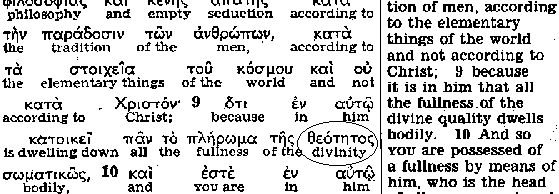
The Greek word 'Theotetos' 'qeothtoV' is first translated 'godship' in 1969, but 'divinity' in 1985. What does the Greek really mean? It is important to find out to check whether in this case the New World Translation is right or not.
R.C.Trench.
'Theiotes, Theotes. Neither of these words occurs more than once in
the N.T.; Theiotes only at Rom. 1:20; Theotes in Col. 2:9. ... In the first
(Rom. 1:20) St. Paul is declaring how much of God may be known from the
revelation of Himself which He has made in nature, ... it is not the personal
God ... but only His divine attributes. ... But in the second passage (Col.
2:9) St. Paul is declaring that in the Son there dwells all the fullness
of absolute Godhead; they were no mere rays of Divine glory which gilded
Him, lighting up His person for a season with a splendour not His own;
but He was, and is, absolute and perfect God; and the Apostle uses Theotes
to express this essential and personal Godhead of the Son.' [Synonyms of
the New Testament by R.C.Trench, D.D. pages 6,7.]
R.H.Countess.
'In the Romans context Paul discusses man's "apologetic" bankruptcy,
recording that God's Special Revelation enables him to know God's eternality
and "divinity," qeiothV, and thus renders all
men everywhere anapologhtouV (without excuse).
QeithV
appears to be a substantivized adjective here, and as "divinity" is here
more fitting than the word used in Colossians 2:9. In the latter place
the apostle, having ostensibly had it revealed to him, inscripturates that
in the God-Man, Jesus Christ, all the fullness of the Godhead, qeothV,
dwells.' [The Jehovah's Witnesses' New Testament, page 65/66, by R.H.Countess
B.A., M.A., Ph.D. (& others)]
NB. 'Substantivized' means 'becomes a noun'.
We have learned that there is a difference between the two Greek words, 'Theiotes' and 'Theotes.' 'Theiotes' refers, almost like a descriptive adjective, to the quality of 'divinity.' Whereas 'Theotes' is referring to the Person of God, revealed in Jesus; His essential Godhead.
Let us now examine Paul and Peter's declaration of the deity of the Lord Jesus Christ.
'looking for the blessed hope and glorious appearing of our great God and Savior Jesus Christ,' Titus 2:13 (New King James Version)[NB. I would normally quote the KJV. However, the KJ translators didn't have the benefit of the information below, so unfortunately they translated these passages as does The Watchtower. As you read on, you will see that The Watchtower does have access to the following information, so their translation is a deliberate mistranslation.]
Simon Peter, a bondservant and apostle of Jesus Christ, To those who have obtained like precious faith with us by the righteousness of our God and Savior Jesus Christ: 2 Pet 1:1 (NKJV)These two statements are very clear. Paul and Peter confessed the Deity of Jesus Christ by referring to Him as "God and Saviour."
".. while we wait the happy hope and glorious manifestation of the great God and [the] Saviour of us, Christ Jesus." Titus 2:13 NWT.Below are shown examples of additions to the English beneath the Greek. The examples are: 2 Titus 2:13 [top], and 2 Peter 1:1 [bottom].
".. who have obtained a faith, held in equal privilege with ours, by the righteousness of our God and [the] Saviour Jesus Christ." 2 Peter 1:1 NWT.

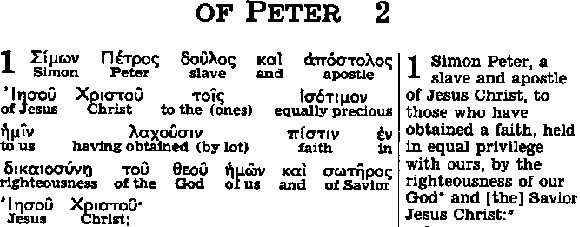
KINGDOM INTERLINEAR 1985 EDITION pp. 942 & 1022.
The Watchtower Bible reads as if two persons are mentioned.
A MANUAL GRAMMAR by Dana & Mantey, page 147, discusses these very verses in detail, under the heading, "Nouns Connected by 'KAI' [i.e. 'and'].
THE GREEK NEW TESTAMENTA long quote, but necessary for clarification. [return to text above]
"(1) With Nouns Connected by kai. The following rule by Granville Sharp of a century back still proves to be true: "When the copulative kai connects two nouns of the same case, if the article ò or any of its cases precedes the first of the said nouns or participles, and is not repeated before the second noun or participle, the latter always relates to the same person that is expressed or described by the first noun or participle; i.e., it denotes a farther description of the first-named person.....
So, in 2 Peter. 1:1 tou qeou hmwn kai swthroj Ihsou Cristou means that Jesus is our God and Saviour. After the same manner Titus 2:13, tou megalou qeou kai swthroj hmwn ihsou cristou asserts that Jesus is the great God and Saviour."A MANUAL GRAMMAR by Dana & Mantey, page 147.
Let us see how The Watchtower Bible treats a verse of similar construction, 2 Peter 2:20.
".. an accurate knowledge of the Lord and Saviour Jesus Christ, they get..." 2 Peter 2:20 NWT.

They haven't changed this into two
persons, have they?
Robert Countess also deals at length
with this Watchtower mistranslation:
"Secondly, the translation, "the happy hope and glorious manifestation of the great God and of our Savior Christ Jesus," interpolates the preposition "of" before "our Savior." This addition to the text implies that the happy hope and manifestation of glory will be an event in which two personages will be seen, God and Christ Jesus. But the contrary may be seen to be true, and for this reason. More than a century ago Granville Sharp formulated a rule concerning the Greek article with nouns connected by kai:Another long quotation, but I want to assure you that Greek scholars do not agree with the translators of The New World Translation of Jehovah's Witnesses.When the copulative kai connects two nouns of the same case, if the said article o or any of its cases precedes the first of the said nouns or participles, and is not repeated before the second noun or participle, the latter always relates to the same person that is expressed or described by the first noun or participle; i.e., it denotes a farther description of the first-named person.Applying it to Titus 2:13, tou megalou qeou kai swthroz hmwn cristou Ihsou,one observes that tou goes with "God" and "Savior." This future expected hope and manifestation is that brought by the advent of the one person "Jesus Christ, the great God and our Savior." Furthermore, if kai be taken as ascensive, the phrase may be rendered "the great God even our Savior." Acts 26:30 illustrates the repetition of the article with two nouns connected by kai to indicate different persons. Granville Sharp's dogmatic "always" certainly invites a search for exceptions and Mathew 17:1 may be one."THE JEHOVAH'S WITNESSES' NEW TESTAMENT, by Robert H.Countess, page 69. (NB. ascensive means more intensive.)
Let us compare the Greek construction of 2 Peter 1:11 with 2 Peter 1:1.


tou kuriou
hmwn kai swthroV Ihsou Cristou.
of the Lord of us
and of Saviour Jesus Christ
The Watchtower translation, right hand column, is:
"of our Lord and Saviour Jesus Christ." 2
Peter 2:11.
tou qeou
hmwn kai swthroV Ihsou Cristou.
"of the God of us
and of Saviour Jesus Christ."
The Watchtower translation, right hand column, is:
"of our God and [the] Saviour Jesus Christ."
2 Peter 2:1.
Identical Greek constructions, apart from the two different words, Kyriou (Lord) and Theou (God). Yet The Watchtower chooses to translate the rest of the verse differently in the two cases, just so that their Bible supports their doctrine. They didn't make 2 Peter 1:11 read as though it were speaking of two persons, as they did just 10 verses earlier, did they?
Another verse that The Watchtower distorts is Hebrews 1:8.
'But unto the Son he saith, Thy throne, O God, is for ever and ever: a sceptre of righteousness is the sceptre of thy kingdom.' Hebrews 1:8 (KJV)Here, God is calling His Son, 'God,' proving the Deity of the Lord Jesus Christ. But The Watchtower cannot have that, so again they depart from their Greek with the result that Jesus is said to be sitting on God.
The Greek side points out that 'the Son' is 'the God'.

Here, in order to resist saying that God calls His Son, 'God,' The Watchtower
ends up calling God 'a throne.'
Christians have no difficulty recognizing
that the Father and Son share the throne.
The Father and the Son are happy to share the throne. But The Watchtower Society make a nonsense of Hebrews 1:8 in an attempt to hide the Deity of the Lord Jesus Christ."God is your throne [Hebrews 1:8 NWT]", reads their translation.
- 'I and my Father are one.' John 10:30 (KJV)
- 'All things that the Father hath are mine: therefore said I, that he shall take of mine, and shall show it unto you.'John 16:15 (KJV)
- 'And there shall be no more curse: but the throne of God and of the Lamb shall be in it; and his servants shall serve him:' Revelation 22:3 (KJV)
As Scripture consistently points to the Deity of the Lord Jesus Christ, Christians have no difficulty understanding that Jesus has 'a name which is above every name:' Phil 2:9 (KJV)
Of course, The Watchtower Society doesn't like this admission, so they try to imply:
"How could Jesus have the name above every name? The Bible means that Jesus had the name over every name, except God's name. His name was over every OTHER name but God's.'That's the answer a 'witness' would give us. And that's exactly how The New World Translation treats Philippians 2:9....

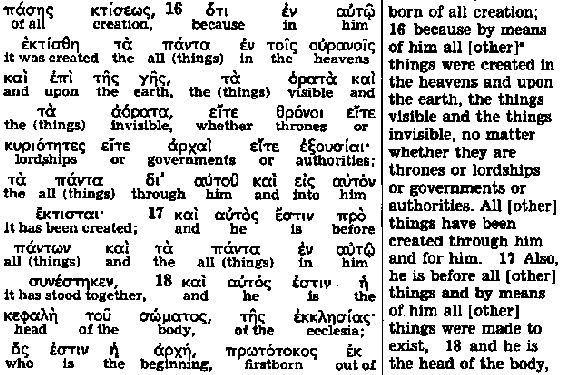
Because Jesus is God, Christ's coming down to earth as a sacrificial
Lamb is all the more gracious and wonderful.
To Jehovah's Witnesses however, Christ was simply a highly exalted
angel, an archangel, doing what He was told by His Creator God. [See Article
No.1, 'The Deity of the Lord Jesus Christ.'] Therefore, yet another
Scripture cannot remain as originally given.
'Take heed therefore unto yourselves, and to all the flock, over the which the Holy Ghost hath made you overseers, to feed the church of God, which he hath purchased with his own blood.' Acts 20:28 (KJV)Verses 24,25 and 27 are all referring to God, so Luke is telling us that God shed His own blood. Again this doesn't present a problem for Christians, for in Zechariah 12:10, where God [vs.1, LORD = Jehovah] is telling Israel that the time will come when:
'And I will pour upon the house of David, and upon the inhabitants of Jerusalem, the spirit of grace and of supplications: and they shall look upon me whom they have pierced, and they shall mourn for him, as one mourneth for his only son, and shall be in bitterness for him, as one that is in bitterness for his firstborn.' Zechariah 12:10 (KJV)Again The Watchtower must alter Scripture to fit with their doctrinal position.

Notice the insertion of the word [Son] in their translation side, and (one) in the Greek side.
WORSHIP TO JESUS REMOVED.
Jesus was worshipped many times when on earth, and as late as October 15, 1945, The Watchtower advocated the worship of Jesus.
"not the Father which hath sent him." (John 5:22,23) Since Jehovah God now reigns as King by means of his capital organization Zion, then whosoever would worship Him must also worship and bow down to Jehovah's Chief One in that capital organization, namely, Christ Jesus, his Co-regent on the throne of The Theocracy. The holy angels gladly obeyed the divine command and they proved their worship of....." THE WATCHTOWER, OCTOBER 15, 1945 p.313, par.30.Before The Watchtower began teaching that Jesus is Michael the archangel, they even stated that Michael had to worship Jesus.
"His position is contrasted with that of men and angels, as he is Lord of both, having "all power in heaven and earth." Hence it is said, "Let all the angels of God worship him"; [that must include Michael, the chief angel, hence Michael is not the Son of God] and the reason is, because he has "by inheritance obtained a more excellent Name than they." Michael or Gabriel are perhaps grander names than Jesus, though Jesus is grand in its very simplicity, but the official character of the Son of God........" WATCHTOWER, NOVEMBER 1879 p.4. [reprints p.48]However, by 1959, The Watchtower was saying that Jesus was not to be worshipped.
"Certainly for one to believe the teachings of Christ he must know and worship the God that Christ worshiped. Do not erroneously conclude that Christians are to worship Christ; that is not what he taught. True, he is a god, a mighty one, but he did not worship himself and he did not teach his disciples to worship him. Rather, on......." THE WATCHTOWER, JULY 15, 1959 p.421.It should come as no surprise, then, that when they produced their New World Translation, all references to worship given to Jesus were removed.

Above you see Matthew 2:11 from KIT 85. The highlighted Greek word
is 'PROSEKUNESAN.' They translate
it as 'they did obeisance' because it is given to the Lord Jesus.
Below you see Revelation 7:11, highlighting the same Greek word, 'PROSEKUNESAN,'this
time translated as 'worshiped'
because it is given to God the Father.
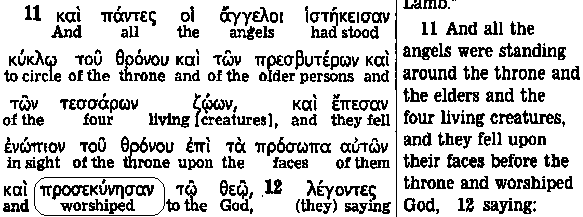
KINGDOM INTERLINEAR 1985, REVELATION 7:11 p.1079.
This is dishonest translation, not based upon the meaning of the Greek word, but based upon a religious bias. The same goes with every reference to worship, if it is given to Jesus. John 9:38 and Hebrews 11:21 shown below again have the identical Greek word, but translated differently depending upon whom it was addressed to. 'PROSEKUNESEN' is the Greek word this time.

KINGDOM INTERLINEAR 1985, p. 456 - JOHN 9:38,

KINGDOM INTERLINEAR 1985, p. 981 - HEBREWS 11:21.
One of the most obvious Scriptures that testifies to the Deity of the Lord Jesus Christ is John 8:58,59.
'Jesus said unto them, Verily, verily, I say unto you, Before Abraham was, I am. Then took they up stones to cast at him: but Jesus hid himself, and went out of the temple, going through the midst of them, and so passed by.'The Jews, who knew their Scriptures well, would not have picked up stones to kill Jesus simply because He said He had been around since before Abraham. They knew how Almighty God had referred to Himself in Exodus 3:14.John 8:58, 59 (KJV)
'And God said unto Moses, I AM THAT I AM: and he said, Thus shalt thou say unto the children of Israel, I AM hath sent me unto you.'The Jews sought to kill Jesus for blasphemy, for they understood that Jesus was claiming to be the 'I AM.'Exodus 3:14 (KJV)
The Watchtower Society is not at all happy with these two Scriptures,
so they change them.
This is their version of John 8:58,59.
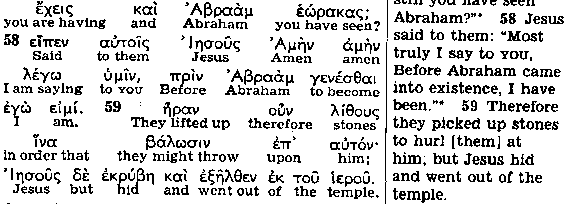
This is their version of Exodus 3:14.
"14 At this God said to Moses: "I SHALL PROVE TO BE WHAT I SHALL PROVE TO BE." And he added: "This is what you are to say to the sons of Israel, 'I SHALL PROVE TO BE has sent me to YOU.'" 15 Then God said once more to Moses: ......" Exodus 3:14 NWT 1981 edition.The Watchtower must hide the truth.
The following shows how they try to get out of an absolutely accurate translation of John 8:58,59.
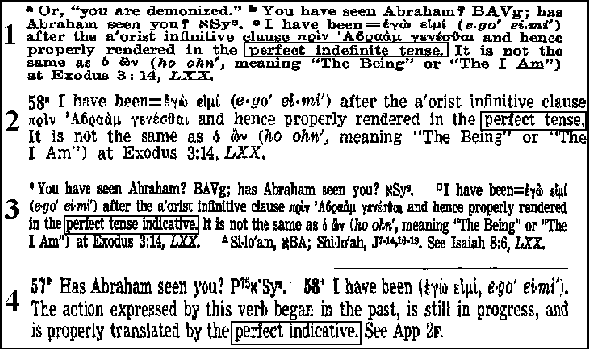
Now we are going to see what they say about Exodus 3:14.
Notice that they admit in the first
three notes above, that in Exodus 3:14 the LXX 'ho ohn' = 'The being' or
'The I Am.' Yet in the note on Exodus 3:14 [below] they say 'LXX reads:
'The existing One [ho On].

They are endeavouring to hide the truth should Jehovah's Witnesses link these two texts.
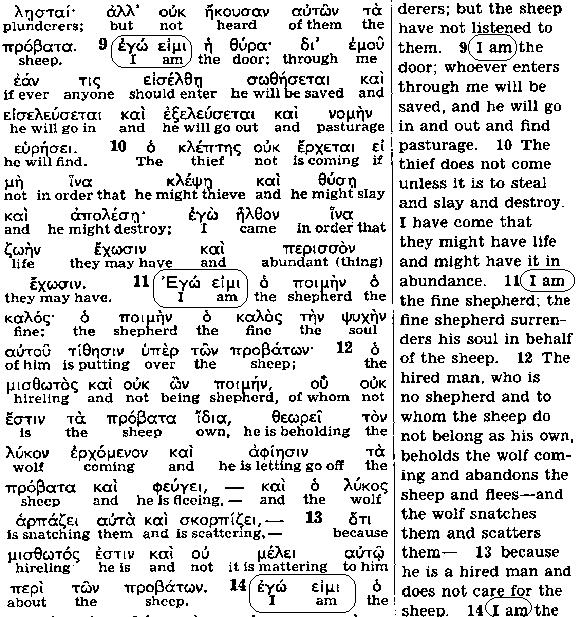
IN UNION WITH .
Because The Watchtower Society want to hold
control over Jehovah's Witnesses, they deny that the Lord Christ Jesus
wants to live 'in' His disciples by the Holy Spirit. So there is another
inconsistent change that occurs over 90 times in their translation.
'Examine yourselves, whether ye be in the faith; prove your own selves. Know ye not your own selves, how that Jesus Christ is in you, except ye be reprobates?' 2 Cor 13:5 (KJV)Jesus does not live in Jehovah's Witnesses, and they are not 'born again.' [See Article No.3 - The Gospel & the Kingdom of God.]
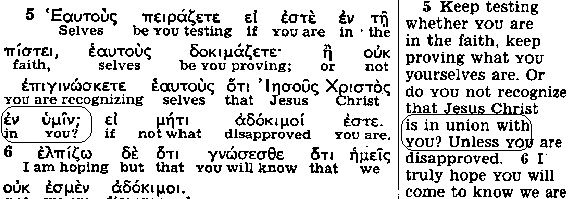
Notice the addition of the two words
'union with,' not found in the Greek side of the text.
They do the same at other places, shown below, but inconsistently,
and where the indwelling of the Lord Jesus Christ is involved.
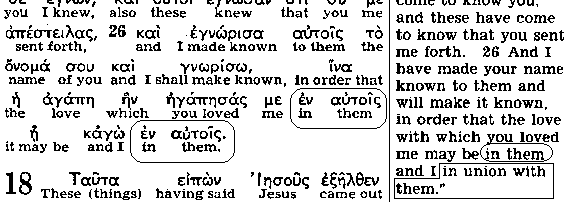
The two Greek words linked together twice are 'en autoiV.' In one phrase they insert 'union with,' but not in the other.
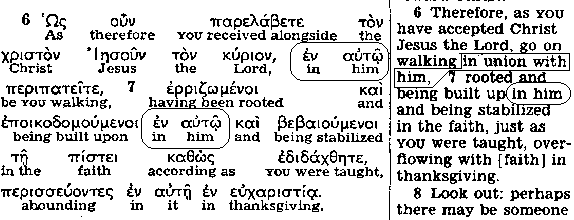
They give the same treatment to Colossians 2:6,7, only this time the two Greek words linked twice are 'en autw.'
"... but we have renounced the underhanded things of which to be ashamed, not walking with cunning, neither adulterating the word of God, but by making the truth manifest recommending ourselves to every human conscience in the sight of God." 2 Corinthians. 4:2 NWT.
"Therefore, how will you respond when pointed statements are made about false religious teachings and corrupt practices? Will you immediately condemn the person or organization making the expose? Do you feel it is all right to teach lies and misrepresent God's Word, but wrong to expose the error? Contrary to what some may think, it is not unkind and unloving to lay bare falsehood and corruption."WATCHTOWER MARCH 1, 1966, p.132.